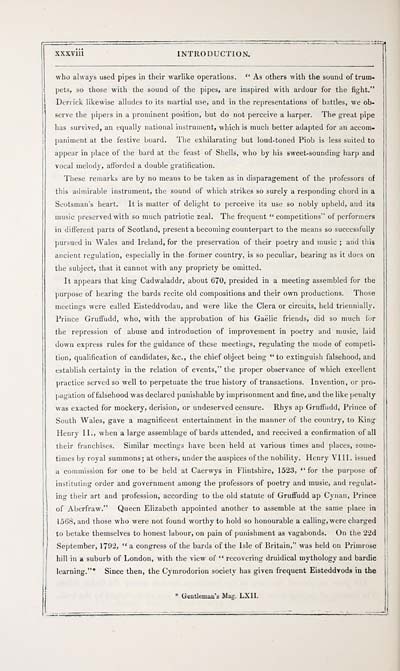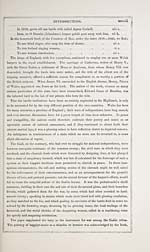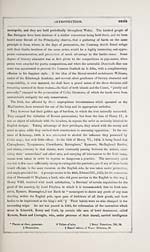Blair Collection > Sar-obair nam bard gaelach, or, The beauties of Gaelic poetry, and lives of the Highland bards
(48)
Download files
Complete book:
Individual page:
Thumbnail gallery: Grid view | List view

INTRODUCTION.
who always used pipes in their warlilce operations. " As others with the sound of trum-
pets, so those with the sound of the pipes, are inspired with ardour for the fight."
Derriclc liltewise alludes to its martial use, and in the representations of battles, we ob-
serve the pipers in a prominent position, but do not perceive a harper. The great pipe
has survived, an equally national instrument, which is much better adapted for an accom-
paniment at the festive board. The exhilarating but loud-toned Piob is less suited to
appear in place of the bard at the feast of Shells, who by his sweet-sounding harp and
vocal melody, afforded a double gratification.
These remarks are by no means to be taken as in disparagement of the professors of
this admirable instrument, the sound of which strikes so surely a responding chord in a
Scotsman's heart. It is matter of delight to perceive its use so nobly upheld, and its
music preserved with so much patriotic zeal. The frequent " competitions" of performers
in different parts of Scotland, present a becoming counterpart to the means so successfully
pursued in Wales and Ireland, for the preservation of their poetry and music ; and this
ancient regulation, especially in the former country, is so peculiar, bearing as it does on
the subject, that it cannot with any propriety be omitted.
It appears that king Cadwaladdr, about 670, presided in a meeting assembled for the
purpose of hearing the bards recite old compositions and their own productions. Those
meetings were called Eisteddvodau, and were like the Clera or circuits, held triennially.
Prince Gruffudd, who, with the approbation of his Gaelic friends, did so much for
the repression of abuse and introduction of improvement in poetry and music, laid
down express rules for the guidance of these meetings, regulating the mode of competi-
tion, qualification of candidates, &c., the chief object being " to extinguish falsehood, and
establish certainty in the relation of events," the proper observance of which excellent
practice served so well to perpetuate the true history of transactions. Invention, or pro-
jiagation of falsehood was declared punishable by imprisonment and fine, and the like penalty
was exacted for mockery, derision, or undeserved censure. Rhys ap Gruffudd, Prince of
South Wales, gave a magnificent entertainment in the manner of the country, to King
Henry II., when a large assemblage of bards attended, and received a confirmation of all
their franchises. Similar meetings have been held at various times and places, some-
times by royal summons; at others, under the auspices of the nobility. Henry VIII. issued
a commission for one to be held at Caerwys in Flintshire, 1523, " for the purpose of
instituting order and government among the professors of poetry and music, and regulat-
ing their art and profession, according to the old statute of Gruffudd ap Cynan, Prince
of Aberfraw." Queen EUzabeth appointed another to assemble at the same place in
1568, and those who were not found worthy to hold so honourable a calling, were charged
to betake themselves to honest labour, on pain of punishment as vagabonds. On the '22d
September, 1792, "a congress of the bards of the Isle of Britain," was held on Primrose
hill in a suburb of London, with the view of " recovering druidical mythology and bardic
learning."* Since then, the Cymrodorion society has given frequent Eisteddvods in the
Gentleman's Mag. LXII.
who always used pipes in their warlilce operations. " As others with the sound of trum-
pets, so those with the sound of the pipes, are inspired with ardour for the fight."
Derriclc liltewise alludes to its martial use, and in the representations of battles, we ob-
serve the pipers in a prominent position, but do not perceive a harper. The great pipe
has survived, an equally national instrument, which is much better adapted for an accom-
paniment at the festive board. The exhilarating but loud-toned Piob is less suited to
appear in place of the bard at the feast of Shells, who by his sweet-sounding harp and
vocal melody, afforded a double gratification.
These remarks are by no means to be taken as in disparagement of the professors of
this admirable instrument, the sound of which strikes so surely a responding chord in a
Scotsman's heart. It is matter of delight to perceive its use so nobly upheld, and its
music preserved with so much patriotic zeal. The frequent " competitions" of performers
in different parts of Scotland, present a becoming counterpart to the means so successfully
pursued in Wales and Ireland, for the preservation of their poetry and music ; and this
ancient regulation, especially in the former country, is so peculiar, bearing as it does on
the subject, that it cannot with any propriety be omitted.
It appears that king Cadwaladdr, about 670, presided in a meeting assembled for the
purpose of hearing the bards recite old compositions and their own productions. Those
meetings were called Eisteddvodau, and were like the Clera or circuits, held triennially.
Prince Gruffudd, who, with the approbation of his Gaelic friends, did so much for
the repression of abuse and introduction of improvement in poetry and music, laid
down express rules for the guidance of these meetings, regulating the mode of competi-
tion, qualification of candidates, &c., the chief object being " to extinguish falsehood, and
establish certainty in the relation of events," the proper observance of which excellent
practice served so well to perpetuate the true history of transactions. Invention, or pro-
jiagation of falsehood was declared punishable by imprisonment and fine, and the like penalty
was exacted for mockery, derision, or undeserved censure. Rhys ap Gruffudd, Prince of
South Wales, gave a magnificent entertainment in the manner of the country, to King
Henry II., when a large assemblage of bards attended, and received a confirmation of all
their franchises. Similar meetings have been held at various times and places, some-
times by royal summons; at others, under the auspices of the nobility. Henry VIII. issued
a commission for one to be held at Caerwys in Flintshire, 1523, " for the purpose of
instituting order and government among the professors of poetry and music, and regulat-
ing their art and profession, according to the old statute of Gruffudd ap Cynan, Prince
of Aberfraw." Queen EUzabeth appointed another to assemble at the same place in
1568, and those who were not found worthy to hold so honourable a calling, were charged
to betake themselves to honest labour, on pain of punishment as vagabonds. On the '22d
September, 1792, "a congress of the bards of the Isle of Britain," was held on Primrose
hill in a suburb of London, with the view of " recovering druidical mythology and bardic
learning."* Since then, the Cymrodorion society has given frequent Eisteddvods in the
Gentleman's Mag. LXII.
Set display mode to: Large image | Transcription
Images and transcriptions on this page, including medium image downloads, may be used under the Creative Commons Attribution 4.0 International Licence unless otherwise stated. ![]()
| Early Gaelic Book Collections > Blair Collection > Sar-obair nam bard gaelach, or, The beauties of Gaelic poetry, and lives of the Highland bards > (48) |
|---|
| Permanent URL | https://digital.nls.uk/81868444 |
|---|
| Description | A selection of books from a collection of more than 500 titles, mostly on religious and literary topics. Also includes some material dealing with other Celtic languages and societies. Collection created towards the end of the 19th century by Lady Evelyn Stewart Murray. |
|---|
| Description | Selected items from five 'Special and Named Printed Collections'. Includes books in Gaelic and other Celtic languages, works about the Gaels, their languages, literature, culture and history. |
|---|

